Highlights on
Non-Operating Room Anesthesia
Chagoury Health Sciences Center Auditorium, LAU Byblos
Speakers and Abstracts
Invited Guest Speaker
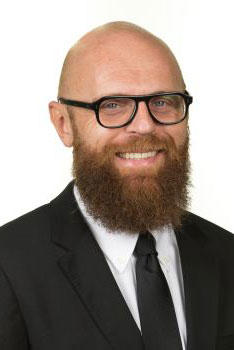
Massimo Lamperti, MD
Dr. Massimo Lamperti is a Clinical Professor of Anesthesiology at Cleveland Clinic Lerner College of Medicine and Chief of General Anesthesiology Department at Cleveland Clinic Abu Dhabi.
Prior to joining Cleveland Clinic, he worked as a consultant anesthesiologist in neuroanesthesia and pediatric anesthesia at National Neurological Institute Besta, in Milan, Italy. He completed his residency in Milan, Italy and then he attended two fellowships in the US and UK. His main clinical field is neuroanesthesia and critical care. In the last ten years, he became one of the main researchers in the field of point-of-care ultrasound and he has been involved in research in depth of anesthesia monitoring.
Dr. Lamperti is a peer reviewer of many international indexed journals in the field of anesthesiology, critical care, pediatrics, and neurosurgery. He is also associate editor of the British Journal of Anaesthesia and of Journal of Vascular Access.
(9:20 - 9:40 am) Session title: Anesthetic Implications for Interventional Neuroradiology Procedures
Abstract
Interventional neuroradiology has dramatically changed the management of neurovascular diseases in the last decades. This new therapeutic strategy implies the involvement of an anesthesiologist who is active part of the team. This lecture will present the potential challenges related to deliver anesthesia and procedural sedation in patients requiring elective and emergency interventional neuroradiology procedures as the new frontiers on how anesthesia and ICU should be considered a continuum in these patients.
(11:40 - 12:00 pm) Session title: Anesthetic Implications for Interventional Gastroenterology Procedures
Abstract
The advent of minimally-invasive surgery has now come to the possibility to treat endoscopically some gastrointestinal diseases and to make diagnosis and treatment during the same procedure. Patients’ safety is a must as the main challenge especially in fragile patients. The aim of this lecture is to give an update on who and how should deliver sedation to these patients and what are the main challenges in this kind of NORA.
LAU speakers
Speakers are listed in the order of the programs’ sessions)
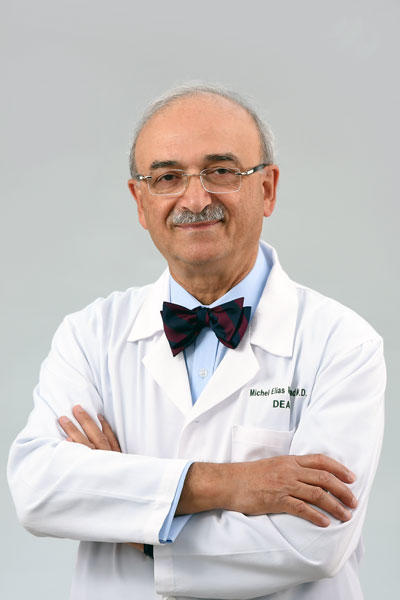
Michel Mawad, MD
Dr. Michel Mawad is the Dean of the Gilbert and Rose-Marie Chagoury School of Medicine.
Dr. Mawad received his Medical Degree from St. Joseph University, Lebanon in 1976. He then moved to New York City to complete an internship and a residency in diagnostic radiology, then he took up a fellowship in Neuroradiology at the Columbia-Presbyterian Medical Center. He assumed his first academic appointments at Columbia University College of Physicians and Surgeons, until 1984 when he moved to Houston. He returned to the Middle East in 2015 after a remarkable 32-year career with Baylor College of Medicine in Houston, Texas where he served as the Chairperson of the Department of Radiology, one of the largest departments in the world, which included over one hundred physicians. Among his other achievements, he also established minimally invasive techniques for the treatment of cerebrovascular disorders such as aneurysms, arteriovenous malformation, and stroke. Prior to his appointment at LAU, he spent two years building a stroke center as a member of the Neurological Institute of the renowned Cleveland Clinic in Abu Dhabi. He has also helped establish the Stroke Center at Baylor College of Medicine. Dr. Mawad is considered a world expert and innovator in the field of Interventional Neuroradiology.
(9:00 - 9:20 am) Session title: Why & When Do We Need Anesthesiologists in the Interventional Neuroradiology Suite?
Abstract
Interventional Neuroradiology (INR) encompasses the diagnosis and treatment of many neurovascular and spine conditions for both adult and pediatric patients. The scope of interventional neuroradiology (INR) has expanded rapidly. Conditions which were previously untreatable or only amenable to open surgical techniques are now being considered for interventional radiological management. As the complexity and diversity of INR procedures increases, the demand for anesthesia also increases. The knowledge of the procedure to be performed, its length, likely complications and intraoperative and post procedure requirements will influence anesthetic choice. This lecture will review the recent updates in INR and discuss the role of the anesthesiologist as part of the caring team.
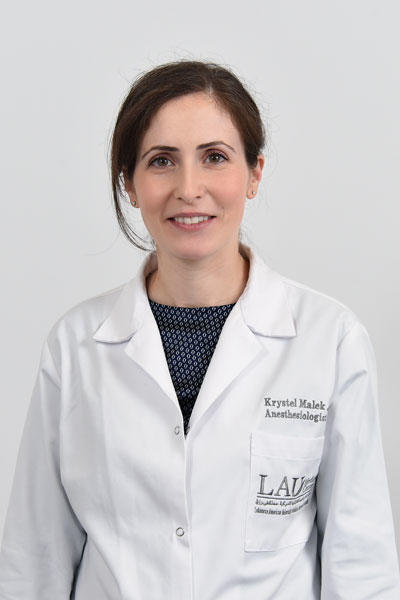
Krystel Malek, MD
Dr. Krystel Malek is an Instructor in Anesthesiology at the Lebanese American University School of Medicine and the Anesthesia Clerkship Co-Director.
She graduated in 2009 from the Saint Joseph University Faculty of Medicine and completed in 2013 a Residency in Anesthesiology at the American University of Beirut Medical Center. She then pursued a Fellowship in Pediatric Anesthesiology and Pain Management at the University of Texas Health Science Center Memorial Hermann Hospital Houston TX, USA.
Dr. Malek’s subspecialty is focused on all facets of pediatric anesthesia including pediatric airway, neonatal conditions, congenital malformations, neurosurgery, visceral, orthopedic, ENT and ophthalmic pediatric cases. Her clinical expertise and research interests revolve around the challenging perioperative care of infants and children with metabolic and genetic diseases.
Dr. Malek joined LAU Medical Center-Rizk Hospital in 2015. Along with her clinical responsibilities she is actively involved in the academic development of students and residents as well as in the simulation center as an Instructor in the annual Neonatal and Pediatric workshop.
(9:40 - 10:00 am) Session title: Anesthesia for MRI: Emphasis on Pediatric Sedation
Abstract
Magnetic resonance imagery (MRI) under anesthesia has become increasingly common in the workup of pediatric diseases. The particularity of the MRI suite offers several challenges for the anesthesiologist in charge of sedating the pediatric patient. The presence of the magnetic field affects the choice of machines and devices that can be safely used. The distance between the child and the anesthesiologist renders the care more difficult. The need for a motion-free image implies adequate sedation which can be obtained through general anesthesia or with monitored anesthesia care. All techniques aim at avoiding the risk of respiratory complications. Many medications have been used in combination or alone, including propofol, dexmedetomidine, midazolam, ketamine. Special considerations should be taken for the child with suspicion of neuromuscular disease. Undiagnosed myopathies may fall into the category of myopathy with risk of malignant hyperthermia (MH), or into the category of mitochondrial disease. Management of these two categories of patients is not similar. Propofol which is commonly administered for children with risk of MH has a controversial use in patients with mitochondrial disease. This presentation will review and address all challenging aspects of the perioperative care of infants and children undergoing MRI.
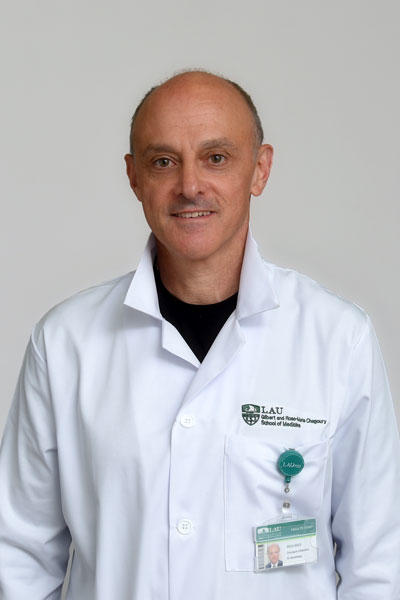
Georges Ghanem, MD, FESC, FACC
Dr. Georges Ghanem obtained his MD from St. Joseph University in Lebanon in 1985; he pursued his Cardiology Residency & Fellowship in Paris under the mentorship of PRs. Jean Acar & Alec Vahanian. Member of major international medical and scientific societies, Dr. Ghanem is:
- Associated member of the French Society of Cardiology since 1989,
- Fellow of the European Society of Cardiology since 2006,
- Fellow of the American College of Cardiology since 2007
- He was elected President of the Lebanese Society of Cardiology (LSC) in 2005.
In his clinical practice, Dr. George Ghanem was a pioneer in introducing major interventional cardiology techniques in Lebanon since 1993: the first Percutaneous Mitral Commissurotomy, the first intra-coronary stenting, the first carotid stenting, in 2012 the first Trans-Catheter-Aortic-Valve-Implantation (TAVI) and in 2015 the 1st Mitral Clip intervention.
His name appears in more than 70 publications (manuscripts, editorials, abstracts and book chapters). He organized, chaired and lectured extensively in multiple local, regional and international cardiology meetings and symposiums. Dr. Ghanem is a permanent faculty member and abstract grader in major European & American courses (Euro-PCR, Gulf-PCR, ACC, TCT, C3)
Dr. Ghanem occupied major leadership positions at LAU Medical Center formerly known “Rizk Hospital” during the last decades as Head of Cardiology, Chairman of Internal medicine, President of the Medical Committee, President of the Executive Committee and Member of the Board.
In September 2016, he was appointed as Chief Medical Officer at the Lebanese American University Medical Center – Rizk Hospital. Since that date he sits on the “Steering Committee for Health Affairs”.
In September 2017, he was promoted to Full Professor in Cardiology at LAU School of Medicine.
In parallel to his activities in the medical field, Dr. Ghanem is a Master in Martial arts; he pursues an intense activity in many sport techniques and conduct counselling activities in sport & health domain.
(10:30 - 10:50 am) Session title: Why and When do we Need Anesthesiologist in the Cath. Lab.?
Abstract
There are some major interventional procedures in the Cath. lab where the presence of an anesthesiologist as member of the “Heart Team” is mandatory. These procedures include TAVI, Mitra Clip, ASD/PFO Closure, Pediatric Catheterization and others. The role of the anesthesiologist in providing the adequate type of anesthesia and managing complications will be reviewed in this lecture. In addition, radiation issues and future perspectives related to the anesthesiologist role at the cardiac Lab will be discussed.
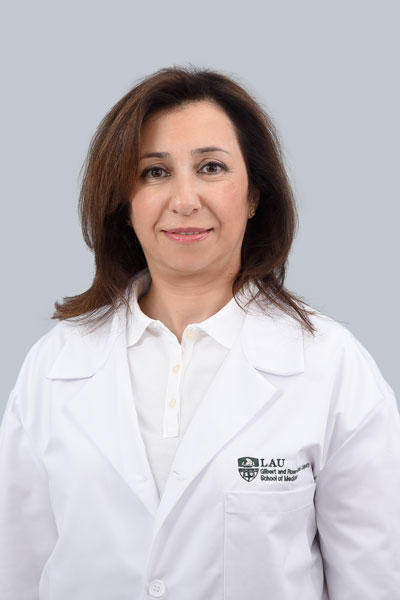
Caroline Chahine, MD
Dr. Caroline Chahine completed her residency in anesthesia and intensive care at Saint Joseph University-Beirut, followed by a cardiothoracic anesthesia fellowship at Bichat Claude Bernard Hospital-Paris. She received a diploma in transesophageal echography from University of Creteil-Paris. Dr. Chahine works currently as anesthesiologist mainly specialized in cardiac anesthesia at the LAU Medical Center-Rizk Hospital. She is interested in students and residents education as well as in simulation-based education .
(10:50 - 11:10 am) Session title: Anesthetic Implications for Interventional Cardiology Procedures
Abstract
The demand for anesthetic support for interventional cardiology procedures is increasing as the number and complexity of these procedures rapidly expand. Providing safe anesthesia care to patients undergoing these procedures requires comprehensive preoperative assessment, involvement in the multidisciplinary planning of these cases, and a detailed understanding of the procedures and their potential complications. This lecture will review the recent updates on the anesthetic management of the common interventional cardiology procedures followed by a brief summary of the LAU Medical Center experience.
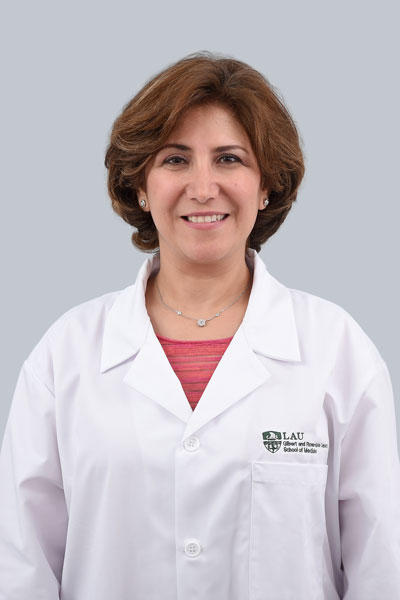
Rajaa Chatila, MD
Dr. Rajaa Chatila is an associate professor of medicine, at the Gilbert and Rose-Marie Chagoury School of Medicine, Lebanese American University and faculty member in the department of Internal Medicine and Gastroenterology division at the Lebanese American University Medical Center-Rizk Hospital since 2009. In February 2016, she was appointed as the Assistant Dean for Graduate Medical Education (GME) at LAU’s school of medicine.
Dr. Chatila graduated from the American University of Beirut with a BS-Biology in 1989 then earned a Medical Degree diploma in 1993. She then completed residency training in Internal Medicine at St. Raphael Hospital, Yale University, in 1996, followed by fellowship in Gastroenterology and Hepatology at Yale New Haven Hospital, Yale University School of Medicine, New Haven, CT. USA which she completed in 1999. Since her return to Lebanon, Dr. Chatila, has worked in several medical centers. She sat on several committees as member and head (head of research and ethics committees, elected head of the medical staff committees in two different hospitals, member and co-chair of mortality morbidity committee, member peer review committee, member of the expert panel at the LOP and member of the scientific committee of LSGE congress). She is currently a member of the LSGE Hepatology committee, SAC committee, heads the GME committee and sits on the Hospital House-staff Committee of LAU Medical Center-Rizk Hospital.
Dr. Chatila is American board certified in Internal Medicine and in Gastroenterology. She is a member of the ECOO, World Gastroenterology Organization and the Lebanese Society of Gastroenterology. She has assisted and participated in numerous educational activities and conferences as invited speaker and moderator of sessions. She has always been actively involved in teaching and assessing medical students, residents and fellows. She also has been advisor to several students and residents.
She has published in peer review medical journals. She is currently involved in clinical research investigating: colorectal cancer, irritable bowel syndrome, gastro esophageal reflux disease and predictors of achievement in medical education.
(11:20 am - 1:00 pm) Session title: Why & When Do We Need Anesthesiologists in the Endoscopy Suite?
Abstract
The scope of interventions performed endoscopically by gastroenterologists is dramatically expanding some replacing the previous need for surgical interventions and others altogether new. In parallel, the number and complexity of gastrointestinal procedures performed with the participation of the anesthesiologist is rapidly increasing. The role of the anesthesia team is determined by the procedure, the technology and the comorbidity of the patients. This lecture will review the recent updates in endoscopic techniques and discuss the role of the anesthesiologist as part of the caring team.
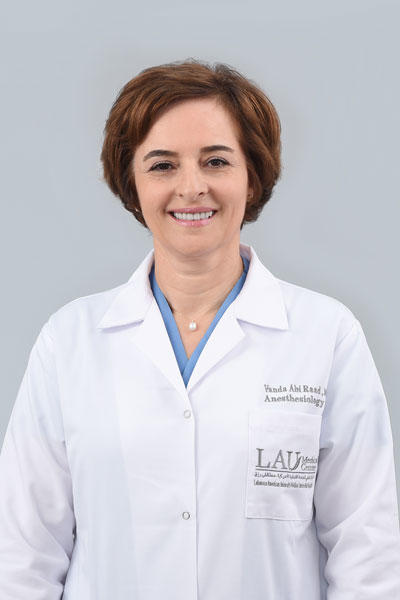
Vanda Abi Raad, MD, MHPE
Dr. Vanda Abi Raad is Clinical Professor of Anesthesiology at the Lebanese American University, Gilbert and Rose-Marie Chagoury School of Medicine. She is the Assistant Dean for Continuing Medical Education and the Director of the LAU-Clinical Simulation Center. Dr. Abi Raad is working as attending staff at the Anesthesia Department at the LAU Medical Center-Rizk Hospital. Dr. Abi Raad is the author of publications on regional anesthesia and pain medicine, medical education and simulation based education.
Session title: Education and Simulation for NORA (12:20 - 12:40 pm)
Abstract
Simulation is an interactive and innovative educational tool that can build confidence, improve clinical knowledge and skills through practice, and enhance team performance. There have been huge technological advances in the use of simulation in anesthesiology in the past 2 decades. Simulation in anesthesiology covers a variety of techniques used for training and assessment, including low to high fidelity models and the use of standardized patients. In addition, based on the Crew Resource Management (CRM) used in the aviation industry for crisis situation, the Anesthesia Crisis Resource Management (ACRM) concept is well adapted to anesthesiologists who face rapidly evolving clinical situations that require immediate decision making.
Anesthesiologists face challenges in practicing in locations beyond the operating room. New locations, inadequate monitoring devices, poor assisting staff, unfamiliarity of procedures, insufficient knowledge of basic standards, and lack of experience compromise the quality of patient care. Therefore, anesthesiologists must recognize possible risk factors during NORA and familiarize themselves with standards to improve safe practice. Simulation, using current technology, offers innovative and reproducible training experience to the anesthesiologist and the medical personnel who require special training outside of their safe zones.
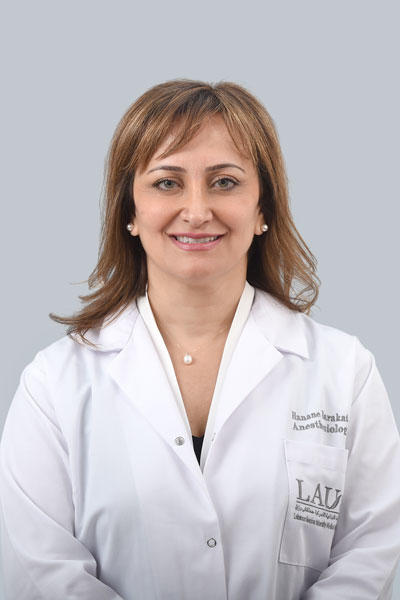
Hanane Barakat, MD
Dr. Hanane Barakat is a Clinical Assistant Professor of Anesthesia at the LAU Medical Center, Gilbert and Rose-Marie Chagoury School of Medicine.
She is the chair of the Performance Improvement committee at LAU Medical Center, and Clerkship Director For Med 4 students.
Dr. Barakat has a great interest in regional anesthesia and pain management as well as in Quality and Patient Safety and Clinical Simulation.
(13:30 - 14:30 pm) Session title: Case Presentations
Abstract
In the past few years, the rise of NORA has been impressive. Anesthesiologists face many challenges in practicing in locations beyond the operating room. New locations, inadequate monitoring devices, poor assisting staff, unfamiliarity of procedures, insufficient knowledge of basic standards, and lack of experience compromise the quality of patient care. Therefore, anesthesiologists must recognize possible risk factors during anesthesia in nonoperating rooms and familiarize themselves with standards to improve safe practice. Multiple interactive case discussion will be conducted to highlights the problems and management when doing NORA.